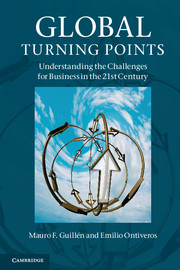Book contents
- Frontmatter
- Contents
- Illustrations
- Tables
- Preface
- 1 Welcome to the twenty-first century
- 2 A global economy out of balance
- 3 The rise of the emerging-market multinationals
- 4 The new demography
- 5 From dictatorship to democracy and failed states
- 6 A disparate world
- 7 The quest for sustainability
- 8 The global powers of the twenty-first century
- 9 Coping with uncertainty and complexity
- References
- Index
4 - The new demography
Aging, migration, and obesity
- Frontmatter
- Contents
- Illustrations
- Tables
- Preface
- 1 Welcome to the twenty-first century
- 2 A global economy out of balance
- 3 The rise of the emerging-market multinationals
- 4 The new demography
- 5 From dictatorship to democracy and failed states
- 6 A disparate world
- 7 The quest for sustainability
- 8 The global powers of the twenty-first century
- 9 Coping with uncertainty and complexity
- References
- Index
Summary
KEY GLOBAL TURNING POINTS
For the first time in human history, several countries have inverted age pyramids with more people above age 60 than below age 20, more people live in cities than in the countryside, and more people suffer from obesity than from hunger.
The twenty-first century is riding a wave of demographic changes that will fundamentally reshape the society and the economy of most countries around the world. Population aging, the shift from the countryside to the city, international migration, lower marriage rates, and the obesity epidemic pose numerous challenges and opportunities. Unlike in previous periods of human history, highly advanced societies with relatively young populations coexist with others experiencing rapid aging. The same diversity in demographic trends is taking place among emerging and developing countries. These trends will make Africa, South Asia, and the Middle East more important demographically, precisely the areas of the world that have proved less stable politically and yet hold most of the world’s exhaustible energy and mineral resources. The twenty-first century promises to match its predecessor in terms of producing new demographic trends. “We are taller, heavier, healthier, and longer lived than our ancestors; our bodies are sturdier, less susceptible to disease in early life and slower to wear out. These changes have occurred in all parts of the world and are continuing to occur” (Floud et al. 2011: 364).
- Type
- Chapter
- Information
- Global Turning PointsUnderstanding the Challenges for Business in the 21st Century, pp. 44 - 65Publisher: Cambridge University PressPrint publication year: 2012



